
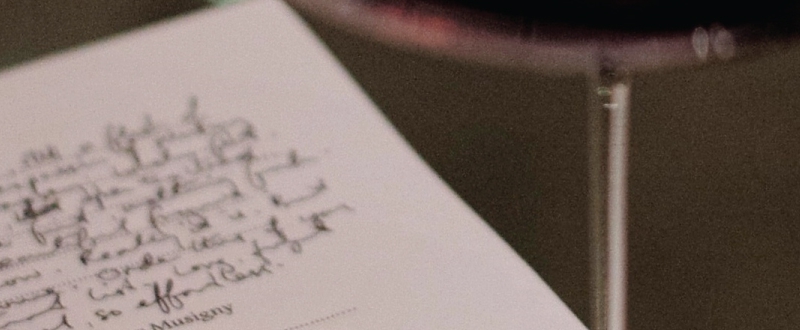
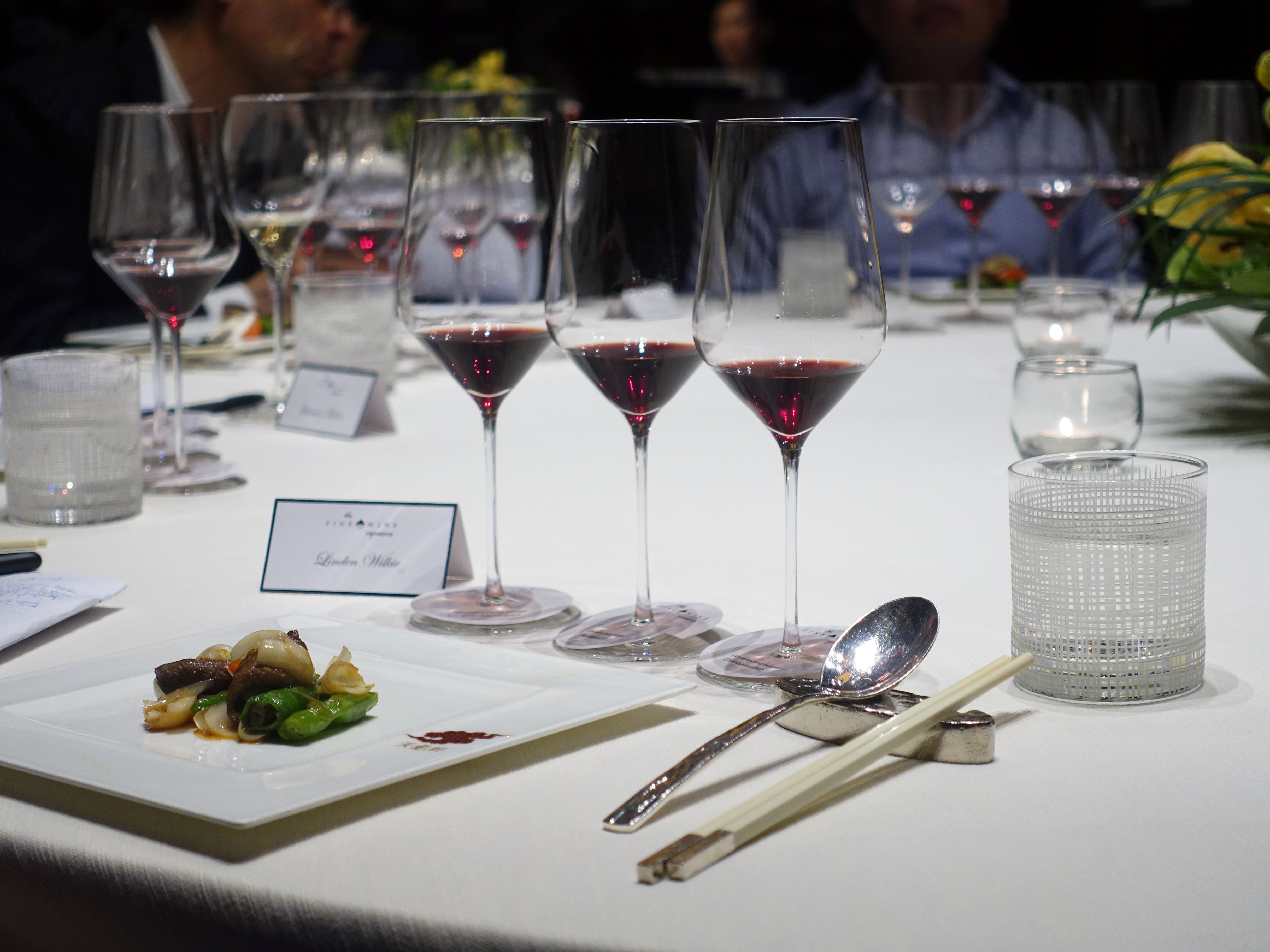
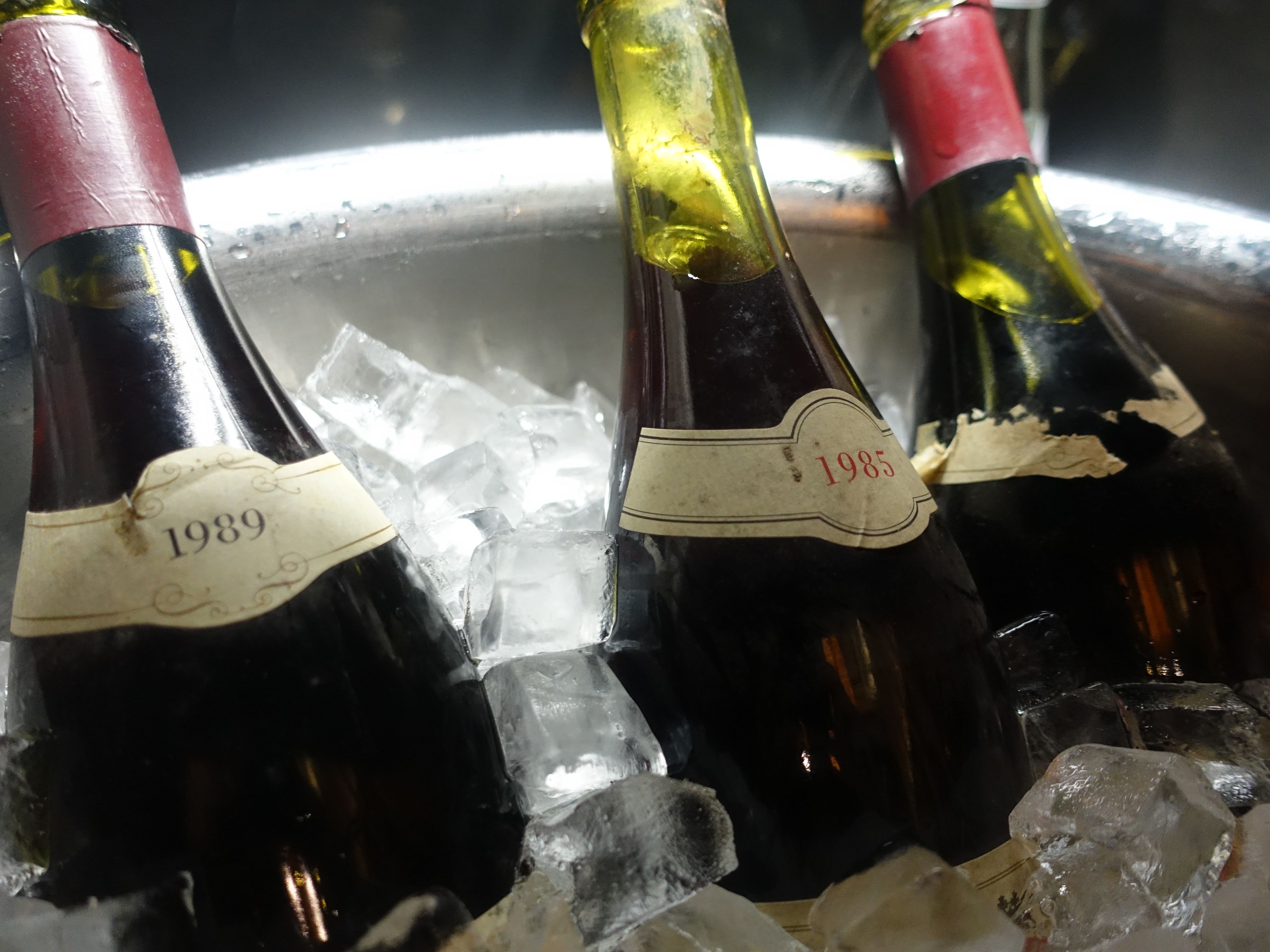
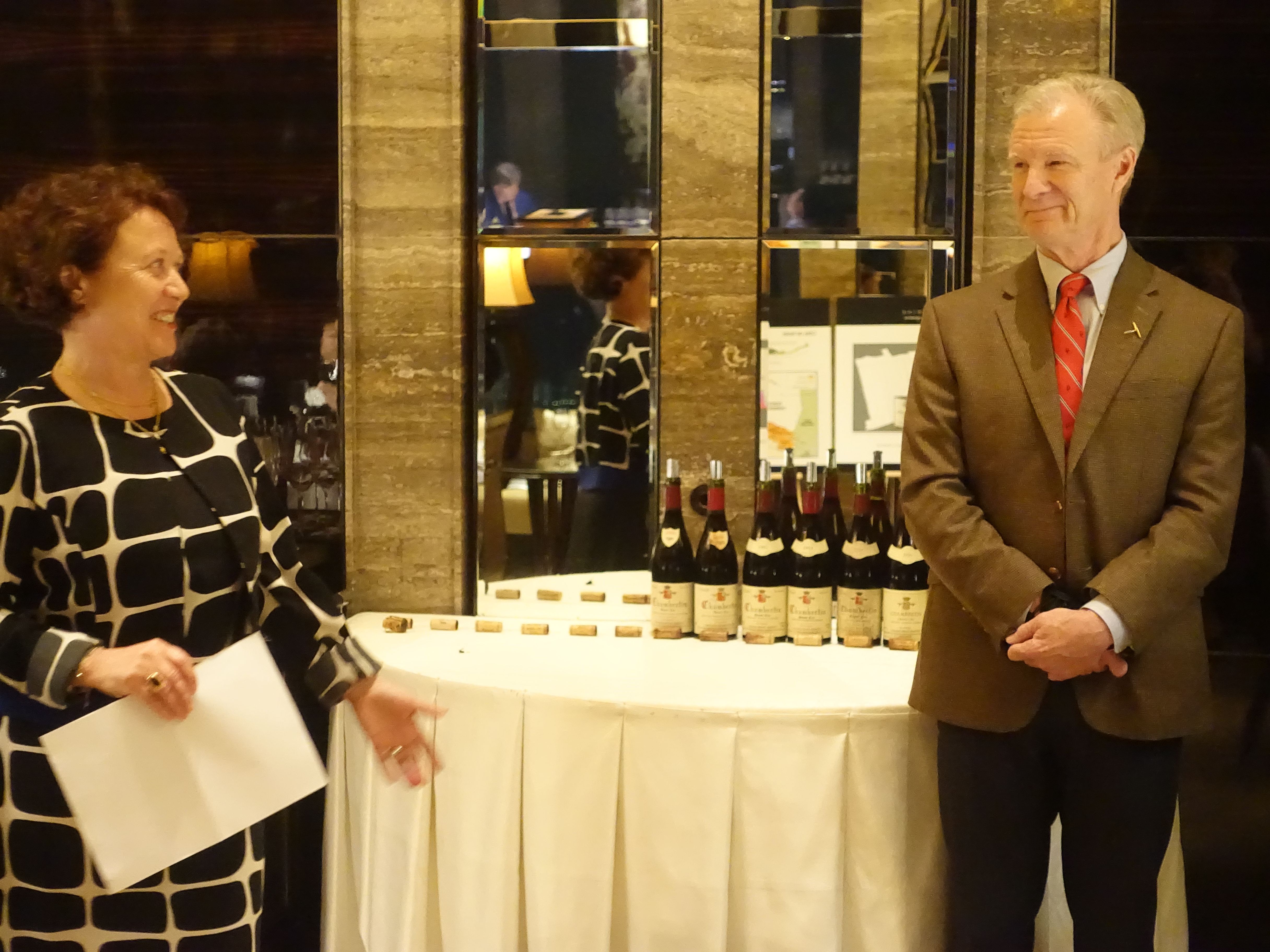
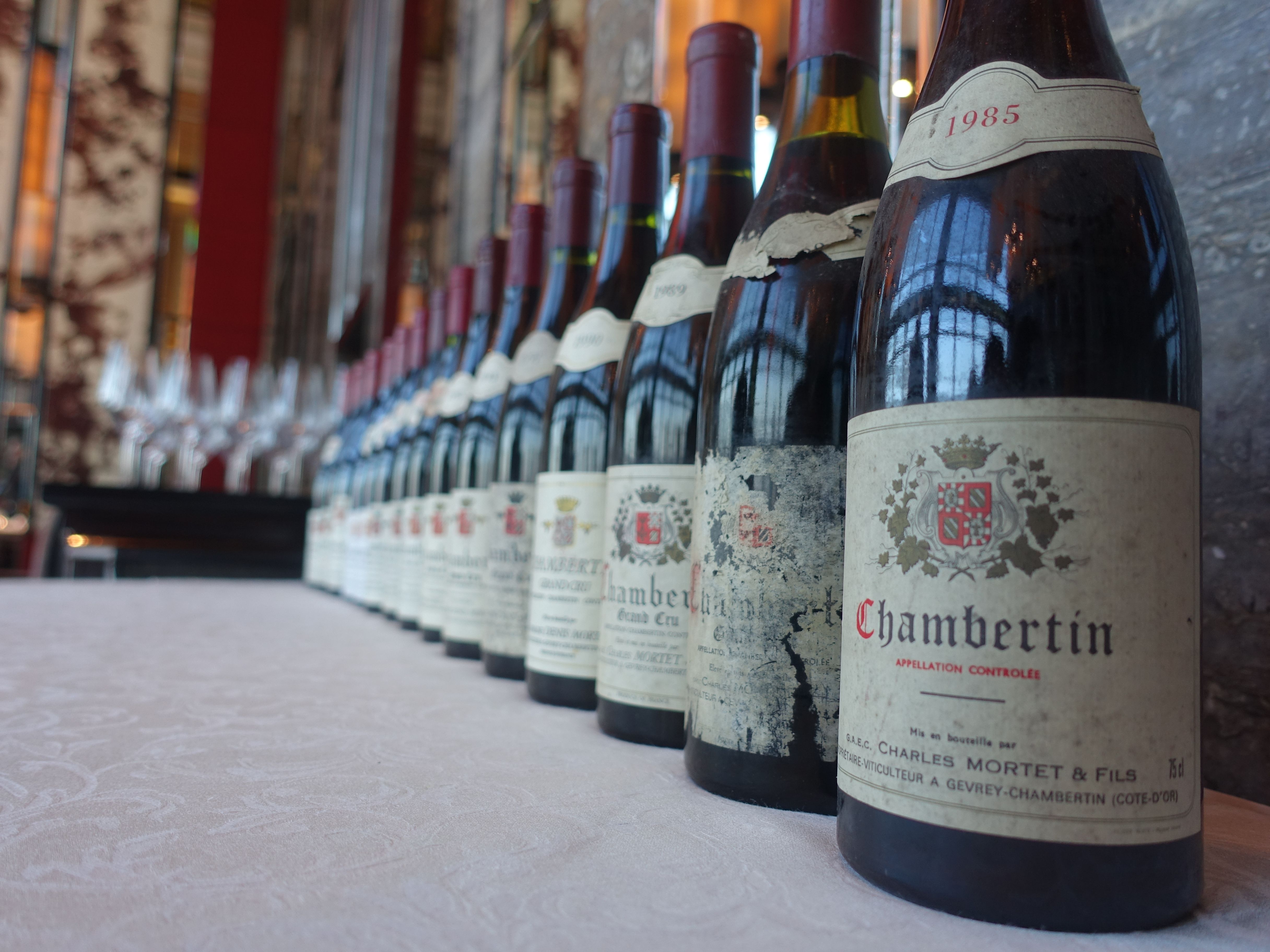
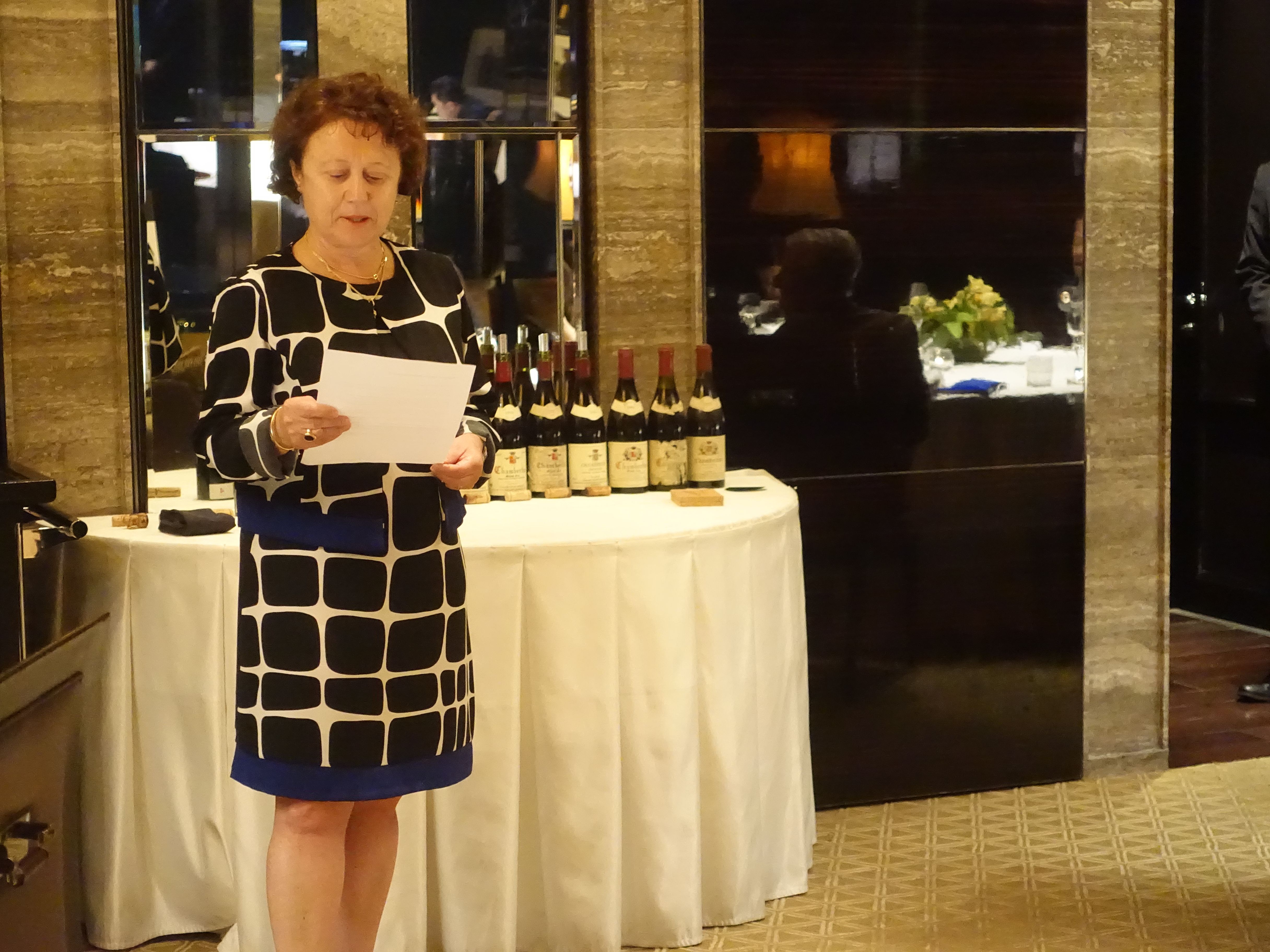

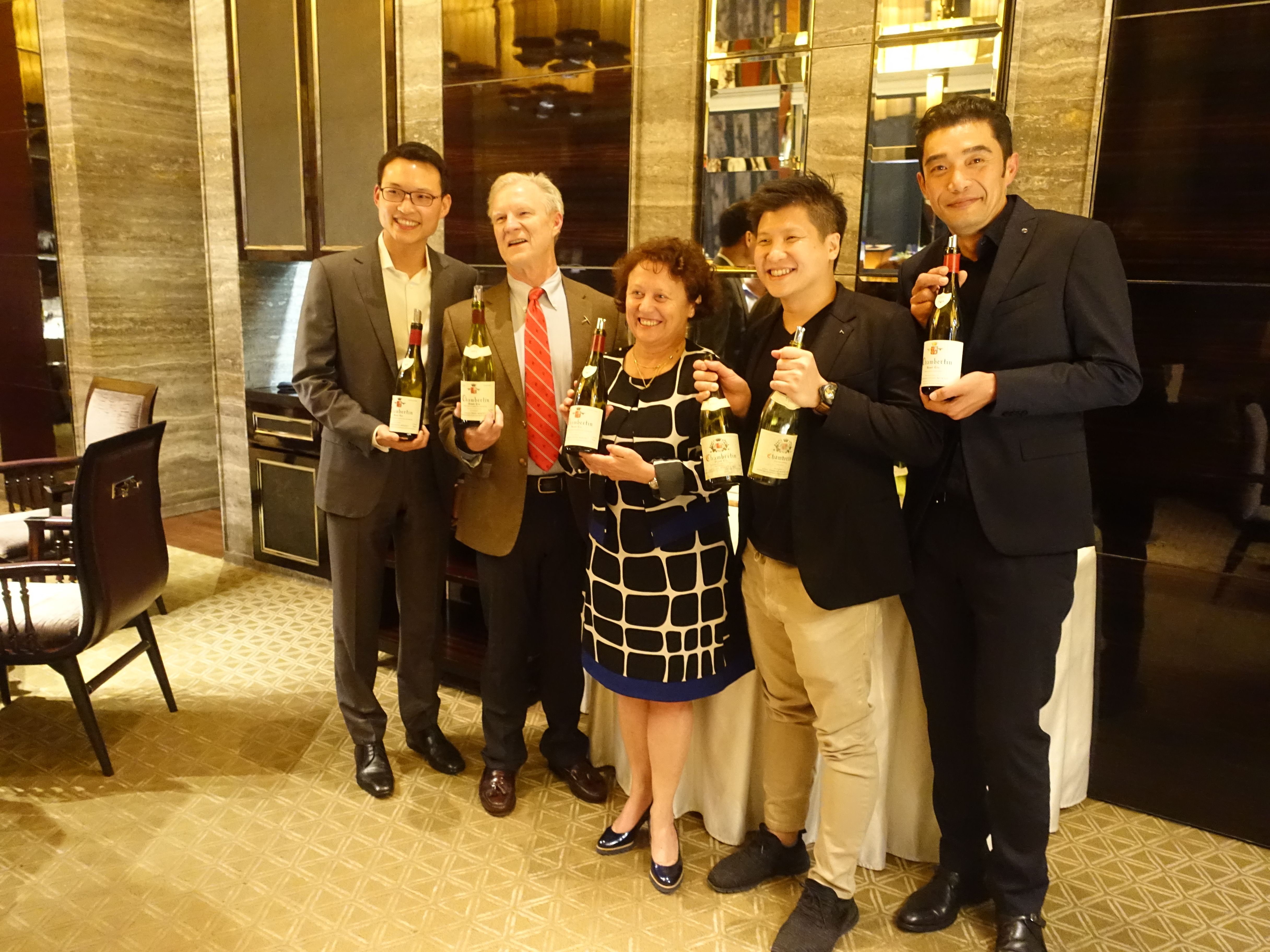
IntroductionThis, our first event in the 2017 The Fine Wine Burghound Sympsoium, proved to be an emotional one, with a few tears shed by the end of the evening. Faced with a wine from an exalted vineyard – the grand cru Chambertin – and an exalted domaine – Denis Mortet – those of us who have the pleasure to enjoy these wines are reminded when we taste a vertical like this – 15 vintages spanning four decades – that we are also bringing to our wine glasses three generations of effort in the life of a family.
|
|
Some vineyard context from Allen MeadowsAllen Meadows began the evening with an excellent overview of the terroir, beginning with Gevrey-Chambertin (and Brochon, the oft anonymous provider of many of Gevrey’s 1er Crus), and then drilled down to Chambertin particular. (Any errors here are in my own notes, but here is what I jotted down as Allen spoke): The Combe de Grissard is narrow and empties out at Latricières-Chambertin. This cool air slows ripening and preserves acidity, especially at night, when in fact it can be downright cold. Eric Rousseau picks his Chambertin Clos de Bèze a full week before his Chambertin. The soil here is browner at the bottom and white at the top – slightly latr picking at the top, and more mineral. Chambertin is small enough to be more uniform than say Clos Vougeot. Chambertin Clos de Bèze can be declared Chambertin but Chambertin cannot be declared Chambertin Clos de Bèze. In practice only 3 domaines utlize this rule – Jacaues Prieur, Henri Rebourseau, and Dujac. What’s the difference between Chambertin and Chambertin Clos de Bèze? Clos de Bèze is usually spicier, a little rounder. But Chambertin comes into its own with bottle age. Eric Rousseau says 25+ years. It ‘wins in the end’. I prefer Clos de Bèze in its youth. Coolness means Chambertin can be a little austere, like a Clos Vougeot, in its youth, but it is majestic. Indeed many historically have referred to it as majestic. To give you some indication as to how cool the vineyard can be, up until around 1950 there was even some Chambertin Blanc. |
|
Speech given by Mrs. Laurence MortetAllen having set the geographical scene, it was time for Laurence Mortet to address the room. Laurence spoke from carefully prepared notes, in English, and with the combined emotion and authority of someone who had travelled to Hong Kong for this dinner, to taste, and to speak about her work – not only her life’s work, but that of her late husband, her father-in-law, and now her children. We were left well-informed but also quite moved. I repeat Laurence’s speech here, from her notes… Good evening ladies and gentlemen, Thanks to the very kind invitation of Fine Wine Experience, I have the great pleasure and the honor of being here this evening with you in order to shortly share with you my wonderful experience in the field of wines. The wines you will be tasting tonight are the result of the work of three generations of winegrowers, three lives and three members of one same family. Each generation, working the same soils, has transmitted through its wines its own personality according to the uses and costumes of each period of our history but always carefully respecting the basis of the same centuries old traditions. In my case, my generation, I have started this lifetime experience 39 years ago thanks to my husband Denis Mortet with whom I have learned and shared with devotion and passion the wonderful art of wine making. Since then, with my son Arnaud, and recently also with my daughter Clémence, we continue to pursue as a family our commitment to provide excellence in the quality of our wines, wines which are for us not just a produce, but a tool with which we can exchange and share our culture and tradition throughout the world. The profession of winegrowers, which if done in a certain way can be a true art, implies an addition and a coordination of many different elements and tasks, each of which requires a full knowledge and devotion at work. This addition of elements, starts at the soil, “le terroir” as we call it in Burgundy. These “terroirs” have very carefully been selected since the early middle ages, 900 years ago by the monks. They gave birth to the unique worldwide concept of what is called: “les climats, which is found exclusively in our region of Burgundy. This concept has even been now selected by the UNESCO as a world heritage. On these very carefully selected soils, specific vines have been planted for centuries. Their grapes are harvested each year and processed in a traditional way which allows, what is at the beginning just a juice, to be transformed into a unique wine through very specific conditions and aging. Tonight’s event reflects precisely our conviction that through excellence in the quality of our wines, through our devotion and perseverance in each day of work, we can create the bricks with which bridges can be built in-between nations and cultures, bridges which unite all the people from around the world and bring us all closer together in harmony, understanding, tolerance and respect. I would like to ask you tonight to play a very special attention to the unique fact of our region in Burgundy which offers, with exactly the same soils and vines, a very large variety of unique wines. The way each winegrower prepares the soil, takes care of its vines, does the harvesting and works on the process of transformation of a juice is into wine, makes each wine unique even in-between neighboring winegrowers of the same village and region. This evening, I have the great pleasure to share with you 15 vintages of Chambertins from our domain in the company of Allen Meadows who will guide you through this wine tasting and who will make it for all of you a unique experience. At last, and not least, I would like to express my deepest gratitude to Mike and Linden for having organized this wonderful event which has brought me here, next to you, as well as to the beautiful city of Hong Kong. Je vous souhaite à tous une très agréable degustation. |
|
Linden’s Reflections on the TastingFor me, reflecting on Allen and Laurence’s speechs, the 15 wines we tasted, and the evening as a whole, the following thoughts have remained with me. It is quite a dramatic exercise to taste through three generations of a family’s work. The changing fortunes, and changing ideas about viticulture and enology spanning 4 decades are condensed into 15 glasses and one evening, so they are easy to appreciate. In Monsieur Charles Mortet’s wines we see fine quality, a gentler, easier style, less intense, well made for their time, though less strictly made than wines are today. Allen provided a superb talk on the evolving economic state of Burgundy in the ‘60s, ‘70s and ‘80s. These were difficult times in which to maintain viability. Coupled with that it took a long time for domaines to get to grips with elevage and bottling which had really been the near sole preserve of the negocients until the ‘80s. It is perhaps unfair to judge Charles’ wines at this distance in time, as they are fading now and were perhaps once greater to experience. I do not mean to be too critical here, but in contrast what we see next is quite dramatic. – In the wines of Denis Mortet we see a transition. The first thing that becomes apparent is a strictness in the farming and sorting of fruit. There is real precision and purity and an increase in intensity. Allen had high praise this evening for Denis’ viticultural work. It is easy to see it in the wine. The winemaking becomes more modern – a glossier, oakier, darker coloured style, but to my palate it never seemed to go too far in the direction. None of the wines tasted ‘masked’ by that appeoach – a testament I think (like Jayer) to the quality of the fruit going into the vat. Finally, it seems painfully ironic that Denis Mortet’s greatest wines were his final ones. In 2003 – a difficult vintage due to excess heat and drought – we taste the exuberance of the year, but a sense of harmony, freshness and balance that is quite unusual. Denis Mortet’s 2002 is an absolute monument to Chambertin. I think it is likely to remain in the rarified peak amongst the very best examples of Chambertin ever made by anyone. It is that good. Though we only tasted two wines this evening from Arnaud Mortet’s tenure, it is clear that the baton has been passed to capable hands. The 2006, made in tragic circumstances for the family, and in a difficult vintage to manage viticulturally (Gevrey was hit by hail), was as Allen Meadows noted ‘completely clean’. Arnaud’s 2010 shows the fine result of the direction he has taken the domaine. Allen noted the influence of some whole clusters that Arnaud has introduced. In Laurence’s words, Arnaud’s wines are ‘elegant, silky, with less tannin than his father’s wines. There is less punching down and less new oak today.’ For me the combination of pride, confidence, and thoughtfulness is in evidence in his wines. He has maintained the lofty quality his father achieved while also shifting the style direction to the very supple and fragrant wines seen amongst top young producers today. All that said, taking in all of the differences in relative bottle age, vintage conditions, and the prevailing practices of each epoch, there was too the voice of Chambertin coming through. Its coolness seemed to offer some restraint in the exuberant vintages like 2003 and 1990, while its strength seemed to help keep alive the likes of 1994 and the very gently fading 1985. A grand yet refined wine. Perhaps ‘majestic’ still stands best today. |
|
2010 Chambertin Grand Cru, Domaine Denis Mortet (LW 97)A fine mid-russet, not overly deep colour, fine hue; some spice on the fresh, high pitched and airy nose, a sweet mossy note, openly spocy yet still youthful red cherry and raspberry notes; on the palate concentrated yet sleek and well-focused, tightly wound, high energy and youthful yet expressive. Super elegance. Floral notes, bright expression, long finish. Brilliant. |
|
2006 Chambertin Grand Cru, Domaine Denis Mortet (LW 93)Moderate depth of colour, still youthful; quite rich sweet and spicy on the nose, darker fruit altogether than the 2010, a touch of menthol and candy, a hint of cola and mocha; a fruity attack with dark cherry, spice, menthol flavours, fleshy up front, good length, less slender than the 2010, but a little less ‘majestic’. Still young. A very good, plump and delicious Chambertin that will come into its own in perhaps another 3 to 5 years. Allen noted and commended the purity of this 2006. |
|
2005 Chambertin Grand Cru, Domaine Denis Mortet (LW 95)Mid+ depth of colour with a touch of development at the rim; a lovely nose, spicy, fine, layered; very complex on the palate, still young with a hint of oak, concentrated yet silky, fleshy, layered and long. Real depth of fruit, very fine, yet full of power. A potent yet refined Chambertin. Wait until 2030+ |
|
2003 Chambertin Grand Cru, Domaine Denis Mortet (LW 95)Some depth of colour; sweet, spicy, a marked note of candy, but there is freshness here too. An exuberant nose; almost, dare I write ‘elegance’ for a 2003, there is concentration, super delicious fruit, it is spicy, luminous, round-textured and well-balanced. Unctuous and spicy – the feel of sunshine here, but it is also fresh, mineral and missing nothing. Surely one of the real stars of the 2003 vintage. |
|
2002 Chambertin Grand Cru, Domaine Denis Mortet (LW 98)A fine colour of mid depth; sweet nose, sous bois, a touch of sweet roast venison, raspberry, moss, very spicy and fragrant, the nose is open and fragrant and super enticing; fine, elegant, driven by mineral acidity, raspberry fruit, very pure in expression, precise yet expansive on the palate and finish which returns a myriad of details and spice. This is just so enthralling you don’t want to drain the glass and miss the waves of fragrance emanating from it, but it is just so irresistible. A spellbinding Chambertin. |
|
2001 Chambertin Grand Cru, Domaine Denis Mortet (LW 94)Bright and clear, showing a little maturity at the edge of the rim; a spicy savoury nose, candied raspberry, menthol, dried meats and a touch of oak-mocha; concentrated on the focused attack, richness, but also more tannic substance, a masculine frame, but it is melting, yielding. A real tour de force Chambertin. Very fine. |
|
1999 Chambertin Grand Cru, Domaine Denis Mortet (N/R)Some depth of colour, but an aged tone with a little tawny at the rim; sweet, meaty and rich on the nose, some tertiary, gamey notes and a whiff of oxidation; delicious, sweet, ripe and succulent on the palate, ample, with a fine-boned structure. But this bottle, in spite of its complexity and fleshiness, is not in perfect condition – suffering a touch of oxidation. |
|
1999 Chambertin Grand Cru, Domaine Denis Mortet (LW 92)A clear, mid-depth open appearance, mature; an airy nose, leafy, spicy and mineral; open, succulent and elegant Chambertin, lacking a touch of richness (vintage’s high yield in evidence). Elegant, fine, very pleasant, but lacks the fireworks of a great Chambertin year. Very nicely made. |
|
1995 Chambertin Grand Cru, Domaine Denis Mortet (LW 93)A fresh colour, still a garnet tone; sweet fruit on the nose, some new oak gloss to this, spocy, a touch exotic, musk, leather notes, perfume; fine on the palate, reserved, focused, a well-structured style, lovely presence of fruit, real freshness. A modern, very good 1995, beginning to drink well, and it seems to have the concentration of fruit, and suppleness of fulsome tannins to age well. Now on a plateau of drinking. Tea leaves, candied cherry and a touch of earth on the finish. This is a different style compared to the younger wines of Denis tasted tonight – glossier, more new oak feel, bold in style Chambertin. But it is one of the most successful 1995s of this style I have tasted. |
|
1994 Chambertin Grand Cru, Domaine Denis Mortet (LW 89)We had the 1993 to serve, but it turned out to be corked, sadly. This 1994 was served in reserve. Quite a loss of colour, but bright in tone, tawny rim; this was opened and immediately served and initially I found it light, dry and a bit shrill. But it opened up nicely. Elegant. Some oak nuttiness. Commendably pure in expression. But this is clearly a ‘little’ Chambertin, now past its short window for best drinking. It’s well balanced, pleasant, but in decline. It’s purity shows the effort and class of the domaine. Allen Meadows noted that this was ‘an incredibly good 1994’. The year, he said, was one where he was in Burgundy during the harvest period, and there was rotten and unripe fruit everywhere. This wine is a success in the context. ‘I really like this wine’, he concluded. |
|
1991 Chambertin Grand Cru, Domaine Denis Mortet (LW 93)Mature appearance; lovely spicy sous bois on the complex mature nose; lush, creamy almost, spicy, sous bois, candied fruit, lovely, old school taste and texture. This is so seductively lush, ripe, with concentration, glycerin in the texture. It is drinking very well. Not the longest finish of the tasting, but such a seductive Chambertin. It feels like it is at the end of its absolute peak, with some gentle decline ahead of it, but it is drinking splendidly today. |
|
1989 Chambertin Grand Cru, Domaine Denis Mortet (LW 90)Good full colour, mature rim; sweet candied chocolate orange (jaffa cake) nose, sweet and appealing, some spice, modest complexity in the expression; a plump attack, lovely sweet fruit, juicy acidity, round texture, roasted fruits, with good succulence. It’s delicious but a bit superficial in depth as far as Chambertin goes. No complaint – it is all pleasure, but the style of is another age, not quite the clarity and detail we might see today. In gentle decline if delicious. |
|
1988 Chambertin Grand Cru, Domaine Denis Mortet (N/R)Mature appearance, bricked right through; initially quite a pongy/socky sort of old school aroma, and a little vegetal. Some decent fruitiness on the palate, but a bit dirty. It opened up to reveal a little more complexity but to my palate never recovered from its grubbiness. Other tasters appreciated it more than me. |
|
1985 Chambertin Grand Cru, Domaine Denis Mortet (LW 92)Fine, mature bricked appearance; a low key sweet earthy nose; elegant in style, sweet with a lovely flavor, not enormous depth nor complexity, but very fine, succulent, charming Chambertin, very appealing, rounded, with decent concentration. Attractive if a little faded now. Biscuity-sweet finish. Charming wine. |
|
